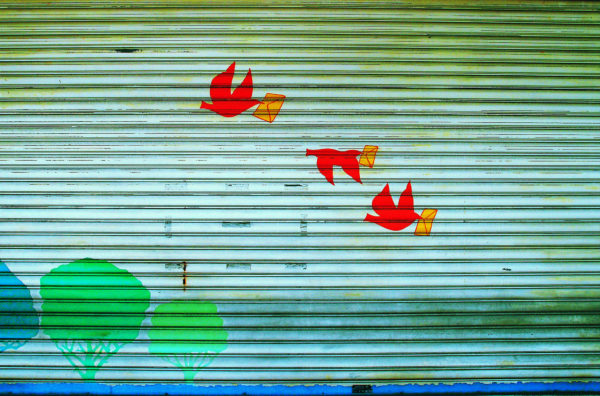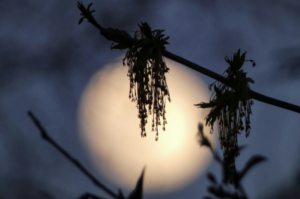Dear Sisterly,
I write to you from somewhere in the slums of GRA because today, after six years, I revisit the state where I met you. But we entered from Elele which was unlike what I imagined—a grand descent towards 1st & 2nd Artillery and on to Rumuola, through Oyigbo, that city that seems to have slept through centuries and is reluctant to shake off its slumber even after waking—and I felt we entered Port Harcourt from the back door.
This time, we passed over a flyover like the one at Rumuola and the surrounding area spread out like the work of an amateur pointillist, with lights from the headlamp of cars and electric bulbs in front of shops peeking through the darkness, resembling illuminated wormholes. It was a charged nightlife that I thought of, looking at all the cars that moved slowly in traffic and the pedestrians that weaved through them, at the shops by the roadsides and their insides that shone white behind glass walls.
You might not have been the concern of my visit but then it mattered not; I thought of you, a fair presence mixed up in this rush of activities.
Cities are memories of people I know in them. For these past six years, Port Harcourt has been petite and yellow and Oyigbo tall-framed and fine-faced and caramel, because these features best describe you and Favor, the boy I once told you about. Sometimes I think about him: where he might be, what he may look like now, and I wonder what it is about some people that makes them bona fide members of our minds. It seems like the mystery of attachment, the inability to leave certain aspects of the past, or more accurately, their insistence in clinging to us. But then it is to you I write, and this is because the memories keep returning at every other interval, like birds after they have stayed out their time in migration.
A seventeen-year-old boy may be expectedly awkward around a girl if he grew up in a laid-back neighborhood and a family that minded association with girls. If I was sort of intimidated by girls while growing up, it certainly was a result of such a nurturing environment, but then seventeen was my lottery number and you were the magic that worked it. Perfect.
To say there is always a first time is cliché, but yours was the first female friendship I had. It was short-lived, but my mind never slipped into doubt, the kind that makes you question the balance of the warmth you feel for people. The assurance was there, from the very first day, the very first words, your affectation when you patted the space beside you and asked me to sit. It was sisterly: that is how I feel it now, your tone when you said, “How are you?” You were granting me a binding offer in that moment, a place to sit beside you and a modest concern. And you maintained that space for the following days when we would meet during examinations because I was insufferably always late. What else best defines friendship?
A girl may crush a boy’s heart or make him feel infinite happiness. It was happiness that I felt, the first experience of what I would later feel for some other girls, a fondness for someone’s company that is unconcerned about having more than just the company. What is in friendship that makes us all desire it? I don’t know but I have some memories, abiding recollections of you, mental companies that have kept the spot you always sat beside me warm. Maybe you will remember when I tell you, Sisterly.
Songs — you had a lot of them in your black Samsung handset that flipped up when you pushed the screen. The phone itself was suggestive of your social status, like the Lexus RX 300 you and your dad came in the day you visited, which you maintained in such a way that did not keep people around you-me-uncomfortable. About the songs, a mundane, conventional mind would say they were un-girly and unfitting for you, judging from your frame and manner. It is not usual for a fair young girl with a slender build which may suggest fragility to like rap. I remember Akon, but I also remember Eminem, an abrasive rapper, and Busta Rhymes too. I can’t remember the rest, but I listened on every day, your earphones plugged into my ears and the songs blaring on. And one day you talked about how you liked them and made a case for their coherence—“You can actually hear what they’re saying. If you listen, you’ll hear.”
Things would happen later, in university, that would remind me of you and your love of rap, and how musical genres are not defined by appeal. Beyonce’s “Run the World (Girls)” was playing on my laptop, full of audacious lines, and this boy worked into my room to fulfill his great masculine commission—“Ahn-ahn! Why you dey listen to girls’ song? Abeg play Drake or Eminem, let’s rock.” I supposed he knew he was playing the wrong card even before he started so I didn’t give a dint of attention to his blabbering. The Alpha Male Syndrome: Episode One.
The second episode had me as a witness. Outside, two of my neighbors, a boy and a girl, were singing along to Cornelius Benjamin’s “Heavenly Race,” a sober song. But then it ended and the next track was by Amaka Okwuoha (Chioma Jesus) and the boy went, “Mba nkea bu egwu umunwanyi,” to the girl’s consent. He started surfing his playlist for a supposedly masculine song. And I wondered what exactly was lacking in the girl’s sensibility that kept her totally blind to a behavior that was to me an intolerable disparagement of her gender.
There wasn’t really any difference in the songs, Amaka’s track sang as much soberness as Cornelius’, but then this boy was able to wedge gender sentiments between them, when the only difference was their voices. I wondered what these boys would say if they came across you playing rap; of course they would find it unusual and may try to correct your mistake. In that moment, though, I began wondering whether you still played rap.
When experiences are placed side by side, we begin to realize how common issues may have deeper interpretations. Yours was a case of a mind that was sure of its right to choices, driven by an internal assurance. It is like knowing your place in the world and not minding external opinions; it exists only in rare minds. And there were other things you did that hinted at the kind of mind you possessed.
The age difference between us never mattered, but it seemed you would not have it taken for granted. Everything about you was rather suggestive, a total lack of the eagerness to show, to assert, which worked better than making direct remarks. Our conversation once veered into who was older, and I wasn’t ready to assume the younger person. At a point you chuckled, and said I shouldn’t think you weren’t older because maybe you didn’t look so. You know, a girl would always be less regarded in age if she’s fair-skinned, slim and soft-voiced, with one of those faces Nigerians call Baby Face. And your tone had a closing effect on the argument. It was like you saying—“I don’t like stating it but then I know my rank and would mind it.” And you also knew your self-assurance and were capable of vibing a bit of it. One incident was remarkable, which had you in a rather smug manner and left me with a memorable phrase.
In a group of students walking ahead of us, a girl stood out and soon became the pivot of our conversation. It was her hairdo that we talked about, mostly praising what we took to be an ingenious pattern of the typical secondary school cornrows: the hair by the sides of her head was weaved to align with her scalp and the centre bunch braided in a way that made it run across her head like the metal arc curving across the Niger bridge. No one noticed your indifference to our admiration until you snorted and said, “There’s nothing fine about the hair, Calabar hair.” I cannot tell what got the others quiet but, for me, it was the offhanded arrogance of your tone, like cold water poured on our excitement. Again, you had your way and the girl bore her dent, even though she was unaware of it.
My trip was really unremarkable because of the strangeness of the roads we took to get to Port Harcourt, and moreover, the sights I saw from the window were mostly bleak. They were nothing like the patterned landscape one might see during a trip from Onitsha to Nsukka: an undulating tableau of hills and valleys draped in greenery. It was always an arts exhibition in motion, especially during an evening trip when the sun could be spotted shinning yellow between a mottled sky and a drowsy landscape. But then we got into traffic at Air Force and I could hear the song which had been muffled by the wind while the road was free. The driver really didn’t make a bad taste of music; it was a bit refreshing after a dull trip, a mix tape of 20th Century songs, across genres: Ras Kimono, Onyeka Onwenu, Mike Okri, Prince Niko Mbarga, Bunny Mack, Yvonne Chaka Chaka. And soon Felix Liberty came on. I only had to hear the quaint beat to know the lines that would follow—Ifeoma, Ifeoma, Ifeoma … I want to marry you/ Give me your love. The city awaited my entry with warm surprises and it reminded me of Nathan.
You remember Nathan? He would always sing those lines about you, and we would laugh and he would tease me and I would manage an indulgent smile for him. Somehow he felt I’ve hit the jackpot having the attention of a girl like you, and he would always insinuate a relationship between us in that childhood manner of teasing by calling you my wife. I felt no need to correct him because his mind was already made up. Mine was rather passing through a subconscious process which I would later come to understand better; it was that perception of a boy-girl friendship beyond juvenile lines. I wasn’t thinking of you romantically: I know now because in retrospect my feelings were free of the complications that usually accompanied such thought.
I met a lot of Nathans in university who accused me of being a girls’ boy. Once, a boy in my department fronted me with an astonishing remark: “Eezer, why don’t you find a girlfriend for him naw? You know you’re one of the playboys in our department.” That was the height of it; my lips were sealed while I thought whether to take his words as a compliment or an indictment. He was making a request for his classmate who happened to be my friend and I fitted the profile of a playboy: he was always seeing girls around me or seeing me around a girl. It didn’t matter that the only relationship I had with a girl in the department was in the second semester of my last year in school. That is what you get when you make many female friends and I learnt it early enough, with you.
Our beginning and end were corresponding angles. I became sick again and stayed away in hospital till the end of the examinations. You were gone by the time I was discharged and there was no proper goodbye. But then you wouldn’t just leave without giving me a moment I’d always remember. Once, on Location Road, on my way to the hospital for check-up, supporting my frame with an umbrella for a walking stick because my strength had not fully returned, I heard someone call my name and it was you on a bike, making a circular motion in the air with your right hand. I always remember that moment. You were going to visit, you said with your hand, and I was going to wait. But then my health was hardly improving and mum had to call me home to nurse me herself; I had been with my eldest brother.
Leaving was leaving you behind, abandoning our friendship, but I always felt that I was going to come back, maybe not to continue the friendship but at least to say a proper goodbye.
Brotherly,
Ebenezer.
**************
Post image byRay Larabie via Flickr
Post image by Freddy Castro via Flickr
About the Author:
 Ebenezer Agu was born in the market city of Onitsha. He is pursuing a career in creative writing alongside his liking for photography, taking out time to write essays on things that interest and provoke him. He did a degree program in English and Literary Studies at the University of Nigeria, Nsukka, where he was poetry editor and blog editor for The Muse No. 43 & 44 respectively. “Dear Sisterly” is part of a series he writes about his friends called “Memories.”
Ebenezer Agu was born in the market city of Onitsha. He is pursuing a career in creative writing alongside his liking for photography, taking out time to write essays on things that interest and provoke him. He did a degree program in English and Literary Studies at the University of Nigeria, Nsukka, where he was poetry editor and blog editor for The Muse No. 43 & 44 respectively. “Dear Sisterly” is part of a series he writes about his friends called “Memories.”










COMMENTS -
Reader Interactions